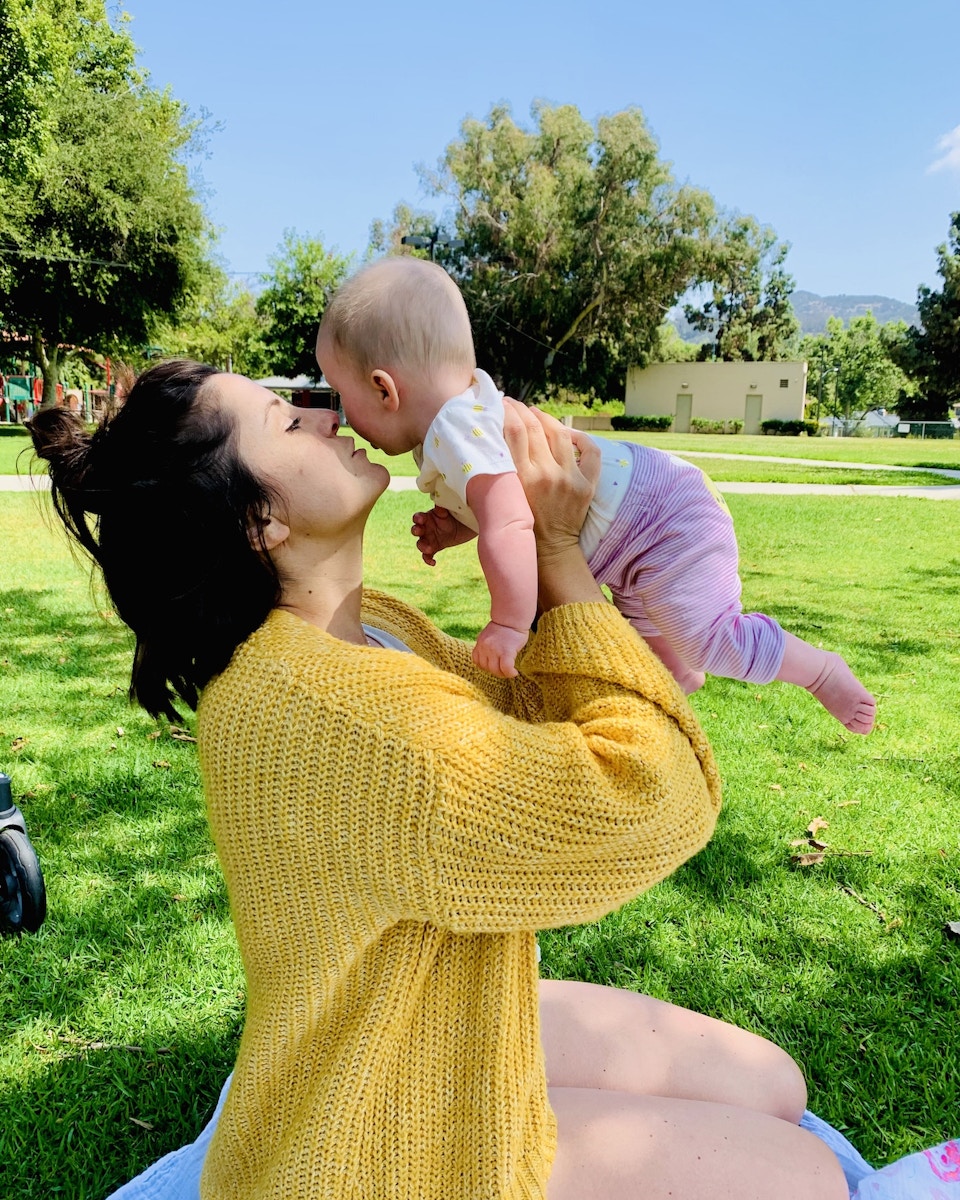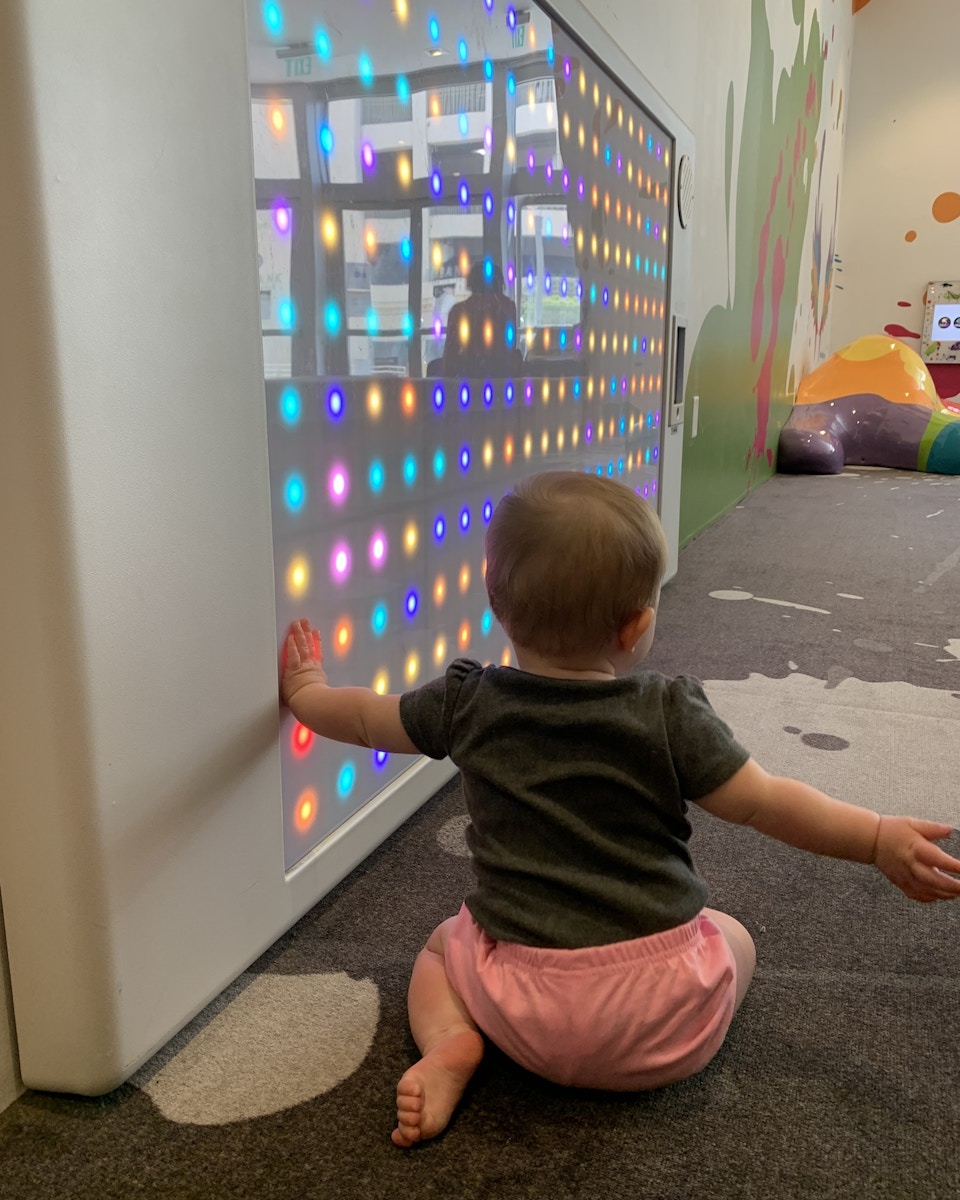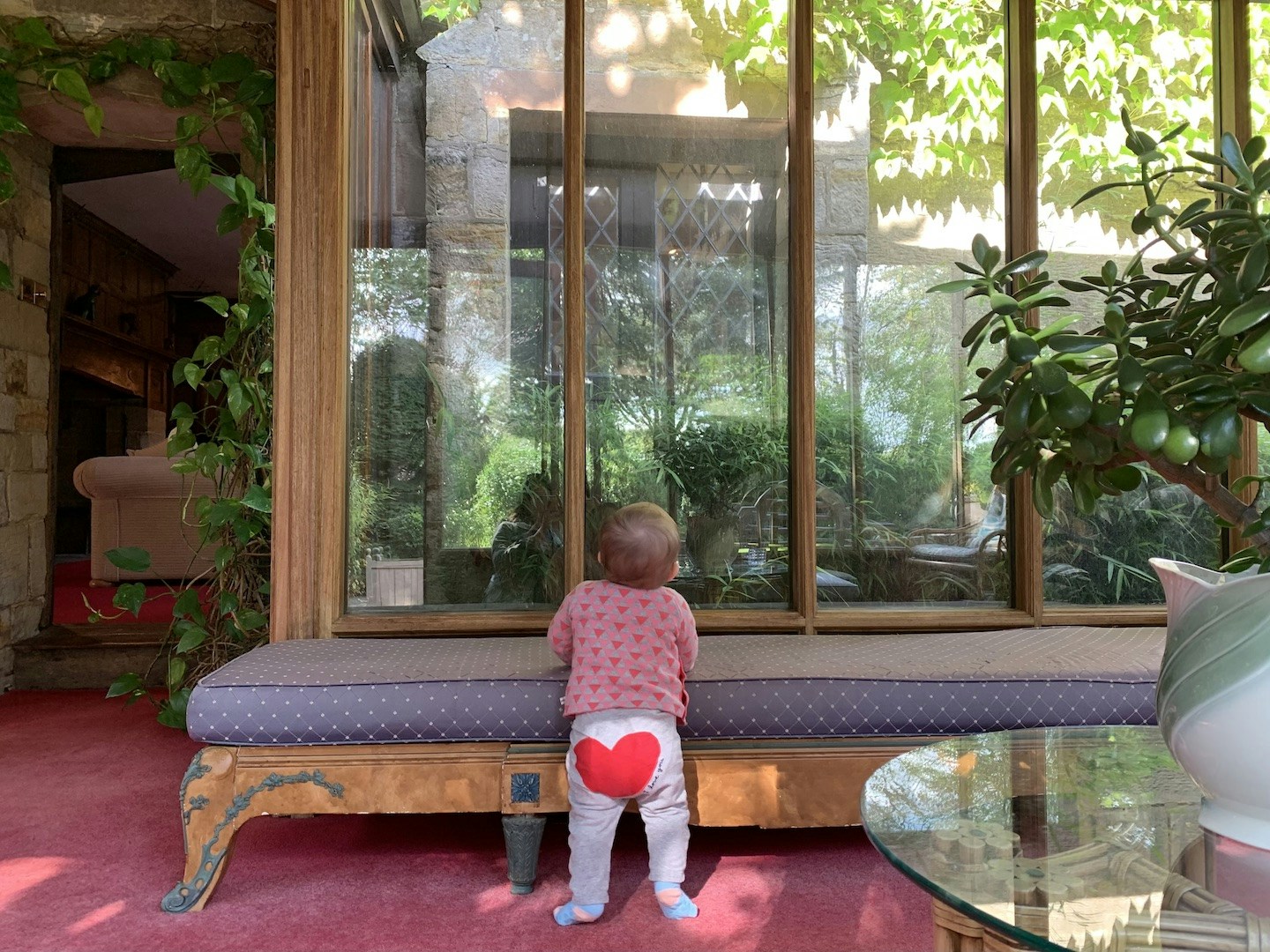
The Great Rewiring of Motherhood
Words by Casey Gates Frey
Mama, no phone, says my two-year-old, catching me head down instead of looking on in awe as she builds a brightly-colored, plastic picnic masterpiece on our living room rug. But I was reading an article! About the dangers of kids having phones! She must have known I was mere seconds away from my thumb inadvertently tapping out of the long-form, insightful piece of writing and into some other app where I frequently scroll through slop. She’s so wise.
Over the last year, Jonathan Haidt’s The Anxious Generation has sparked a new language around discussing children and screens. The tagline for the book is How the Great Rewiring of Childhood is Causing an Epidemic of Mental Illness. The CliffsNotes: a proposal that phones are fucking kids up. The data reveals that the more time they’re spending on devices, the less happy and prepared they are for life in the real world.
My children are currently two and four, at least months away from asking for phones, but I need no further convincing to take preventive measures. I’ve been slamming that JOIN button for groups like Mothers Against Media Addiction and Wait Until Eighth in hopes to get as ahead of it as possible. Because as I’m consuming all of the overwhelming evidence that adolescents are becoming addicted to their devices to such a degree that it’s inhibiting the way they function in the world, it feels… ironic. Given the way I began this article, it’s pretty clear: I’m on my phone quite a bit, too.
I found out I was pregnant with my first child the same week the world shut down in March 2020. Then, after spending my entire pregnancy in a pandemic, I gave birth in November 2020 during the second lockdown of that year. My entry into motherhood coincided with one of the most isolating moments in recent history. Screens were all I had. No manual, no normal.
But even I, a mature adult woman who has (mostly) developed a stronger impulse control than your average ten-year-old, was no match for the addictive, predatory content I was consuming. Because just like the mountains of evidence Haidt presents that adolescents are uniquely vulnerable to the persuasions of social media, so are moms. Particularly when you consider MATRESENCE. Which is the emotional, chemical, hormonal, and biological transition into motherhood that can leave birthing people malleable.
In those days and weeks when a new human life was literally overflowing out of me and demanding all of my care, my brain, my cells—the veil was nearly translucent. A cutesy sketch on the front of a card could send me into a spiral of sobs and despair. Two ounces of breastmilk spilling out of my silicone pump ignited a shock wave of grief within me. Every system of my body was simultaneously repairing itself and expanding amidst inconsistent, 75-minute windows of sleep. A dangerously unguarded state to be in when scrolling through posts like “The most deadly mistake moms make at bedtime.”

"Adolescents are uniquely vulnerable to the persuasions of social media, so are moms. Particularly when you consider MATRESENCE. Which is the emotional, chemical, hormonal, and biological transition into motherhood that can leave birthing people malleable."


In Second Life: Having a Child in the Digital Age, author Amanda Hess describes how quickly the internet began targeting her as a new mom when she switched to “pregnant” mode in her period app. The internet knew she was pregnant before her husband did, and the predatory content immediately infiltrated her feeds. Hey, mama! You DON’T got this! At a time when digital media is battling for our attention more than ever, videos and captions with scare tactics and anxiety-inducing hooks have become a marketing tool to stop the scroll.
When I was something like two months postpartum with my first kid, I came across a video intended to teach moms how to interpret their newborns' various cries. As though all babies have only one very specific cry for hunger or overtiredness, etc. It's this harmful part of parenting culture that tells moms there’s one right way to do things, and if we can’t follow the exact blueprint, we’re failing. At the time I watched this video, my daughter was in the notorious witching hour phase where she would just cry and cry and cry for hours between 5-9pm. Every night. I felt like such a failure for not being able to interpret her cries, understand what was making her so upset, and get her to calm down. In hindsight, I can see she was just a fucking newborn and that’s what some of them have to do. But for weeks I felt so inferior for not being able to “read her cues,” and I can only assume that added anxiety made it more difficult for me to be the calm, consistent presence she really needed.
" At a time when digital media is battling for our attention more than ever, videos and captions with scare tactics and anxiety-inducing hooks have become a marketing tool to stop the scroll."

And it’s not just coming from big tech and major corporations. Even the homesteading momfluencer raising six kids in Utah has had to learn to break through the noise. The ever-changing algorithms have made it much more difficult for her to get half of the views and engagement she was getting in 2018. She’s built a motherfucking media empire from her hand stitched apron pocket and will do whatever it takes to maintain it, ok?!
In an interview with Sara Petersen, author of Momfluenced: Inside the Maddening, Picture-Perfect World of Mommy Influencer Culture, the writer describes how new moms are being tricked into thinking that following momfluencers will make us better mothers. We disengage from our inferiority and just want to be told which diaper bag to buy or which travel car seat is best, because it feels like it makes our lives easier. But in reality, we’re confusing good mothering with good consumerism. That shopping “well” is patriotic and part of being a good citizen.
All of this content being served to moms has amounted to the feeling that everyone else knows how to parent better than you do, and if you don’t do X, or purchase Y, you’re getting it wrong. In Haidt’s book he describes the necessity of young people practicing embodiment, the idea that human beings are hardwired to be physically connected to their environment, using their bodies for communication and interacting with the world through sensory experiences. After raising two children, I can say without a doubt that there is no book, online course, or internet video that can come close to enabling me to be a better caretaker than being connected to my own body and my child’s. The 10,000 hours spent rocking and holding and shushing. Time in. The embodiment of motherhood is irreplaceable and there are no shortcuts, even if the internet spends millions of dollars to try and convince you otherwise.



"All of this content being served to moms has amounted to the feeling that everyone else knows how to parent better than you do, and if you don’t do X, or purchase Y, you’re getting it wrong. "
Social media and the huge increase in hours we now spend on our phones is one of the primary causes of the parent mental health crisis. In 2024 the US Surgeon General issued a warning on parent burnout, a major side effect of our current era of “intensive parenting.” And this is just on top of our country failing us in some of our most basic needs, like paid family leave, quality affordable childcare, and improved maternal health research.
Social media and the culture of comparison is inhibiting birthing people from embodying our own, unique transition into motherhood. Of figuring out our way of doing it and being tolerant of this stage of life feeling hard without immediately assuming it’s because we as parents have done something wrong. If your 6 week old isn’t a good sleeper, it’s not because you’re using the incorrect color of noise or don’t have the best sleep sack. It’s developmentally appropriate for a newborn to cry and squirm and appear seemingly miserable through the majority of their waking life. But this burden of responsibility that parents have adopted, believing they are the root cause for some undesirable behavior in their child, is one of the main points the Surgeon General illuminates in his warning. The internet is shoving propaganda right down our vulnerable little throats.
I’m not suggesting moms put their phones in a lock box while raising kids. It’s not all bad. The virtual parent-and-me class I joined in the pandemic basically saved my life and gave me cherished friendships I’ve maintained to this day. All through a screen. So many wonderful community events and playdates are made possible by the mom groups I’m in online. And some moms have reported their tiny phones are like their portal to connection and relevance and posting is proof of their existence. I’m just arguing for awareness. Decrease of use when possible. Prioritizing our experience of motherhood in the physical form over the virtual one. And transparency and mindfulness when it comes to our own habits around media.


"Social media and the culture of comparison is inhibiting birthing people from embodying our own, unique transition into motherhood. Of figuring out our way of doing it and being tolerant of this stage of life feeling hard without immediately assuming it’s because we as parents have done something wrong."

In our home, we made the dining table a no-phone zone very early on. Like in the baby days where my daughter might take 25 minutes to gnaw on a toast strip and broccoli stem. It could get really boring. But integrating that practice led us to finding other pockets of time where we just don’t have our phones around. And when I was barely surviving the four month sleep regression during my first kid, I consumed shameful education videos during those grueling hours of exhaustion and desperation that nearly broke my brain. I oscillated between taking a militant approach to extinction method one week, to embracing the crunchy mamas who demanded I nurse my baby to sleep the next. So by baby #2, I muted all the sleep training groups I used to devour and intentionally avoided sleep expert content as best I could. Which all contributed to my being much more able to follow my instincts and not second guess myself.
Haidt recommends changing the norms is going to require collective action. Can we rewire some of the brain rot together? Encourage each other that we’re doing enough. Train ourselves to see the sales tactics behind the content, the guilt-trip or rage bait posts whose purpose is to get you to buy, subscribe, share, engage. When a mom friend vents to you about a difficult milestone, tell her it’s OK that it feels hard. Listen to each other and share experiences without always feeling the need to produce a solution. And if you find yourself seduced by the fashionable $400 baby carrier that’s targeting your feed, just remember (no matter how intoxicating their editorial design is), it’s not going to magically turn you into some elevated supermom who elegantly balances her high-power career and 12-step skincare routine all while raising perfect humans.
Casey Gates Frey is a screenwriter and publisher of essays on her Substack The Lady Brain. She is currently seeking representation for her first book- a hilarious and heartbreaking memoir on entering motherhood in the pandemic, internet parent culture, and her experience as a 4x egg donor. Casey recently fulfilled her dream of becoming a Girl Scout troop leader and lives in Los Angeles with her husband and two daughters.